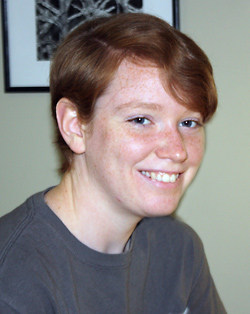Growing up in a home where her mother studied linguistics, Irene Morse was surrounded by a love for languages. Hearing the cadence and rhythms of different languages gave her a curiosity about other cultures as well.

“I’m really interested in how the Middle East is talked about in history books and in the news,” said Critical Language Scholarship winner Irene Morse.
Critical Language
Scholarship Winners
UT Dallas recipients of the Critical Language Scholarship and their destination countries:
2013
Irene Morse, Oman
2012
Allison-Leigh Beatty, China
2009
Samia Hossain, Jordan
Dina Shahrokhi, Morocco
2008
Stacey Knepp, Jordan
Molly Wurzer, Tunisia
Nehe Firoze, India
In high school, she was drawn to learn more about the ongoing conflict in the Middle East and figured that studying Arabic would help her better understand the issues.
Her lifelong passion for linguistic and cultural understanding has been rewarded. Morse is among the 600 U.S. students granted a Critical Language Scholarship for Intensive Summer Institutes this year from the U.S. State Department. She will spend the summer studying intermediate Arabic in Oman, on the southeast tip of the Arabian Peninsula.
“Arabic is not as hard as people often think,” said Morse, an international political economy senior from San Marcos, Texas. “It is more difficult than any Romance language because there are no common roots. And the further you go, the more difficult it gets. But it’s really fun to interact in Arabic.”
Morse is the seventh student from UT Dallas since 2008 to receive a Critical Language Scholarship. The program supports summer language institutes to help more Americans master 13 critical foreign languages needed for diplomacy and trade, including Chinese, Hindi, Korean, Japanese, Punjabi, Russian and Turkish.
A member of the Class of 2010 Eugene McDermott Scholars, Morse has studied abroad in Morocco, which she said was fairly Westernized. “Initially, the people were really surprised I could speak their language,” she said. “I love the people and their culture. They were really hospitable and incredibly kind. They would invite me to their house before they even knew my name.”
Living outside the capital city of Oman, however, she will dress more conservatively, wearing long skirts and a head covering, to fit in with the culture.
Besides becoming fluent in Arabic, Morse wants to study the cultural and historical aspects of a region, and how it has been represented in Western thinking, said Dr. Douglas Dow, coordinator of the Office of Distinguished Scholarships and associate director of the University’s Collegium V honors program.
“I’m really interested in how the Middle East is talked about in history books and in the news. It shapes the way we think about it, and it’s not always helpful for understanding what’s going on,” Morse said. “It’s been in conflict a really long time, and I felt that change needed to happen. I’m a bit less optimistic now than I was in high school, but I believe there can still be a greater understanding between the U.S. and the Middle East.”
Morse wants to pursue graduate work in Middle East studies, and hopes to become a translator, possibly for a think tank or the U.S. State Department.
Dr. Peter Park, assistant professor of historical studies in the School of Arts and Humanities, praised Morse’s “intellectual talent, academic achievement and character.”
“She is an intellectual, a careful analyst and skillful writer, and she understands well the importance of Arabic proficiency for her academic and professional career,” Park said. “I am quite confident that she can meet the challenges of continuing her training in a difficult foreign language while living overseas.”